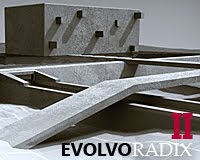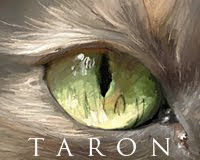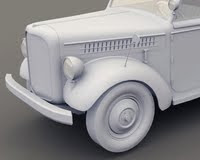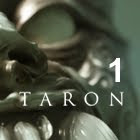 Taron or Timur Baysal, as is his name, talked with us about his craft, inspiration, education, drive, and the VFX industry.
Taron or Timur Baysal, as is his name, talked with us about his craft, inspiration, education, drive, and the VFX industry. Due to the length, and other practical considerations, this interview is split in two parts.
Note: Due to the art subject, some of the images might be disturbing to some viewers.
The Interview, part one:
1. Where do you come from, and how did the native culture affect your ethics?Note: Due to the art subject, some of the images might be disturbing to some viewers.
The Interview, part one:
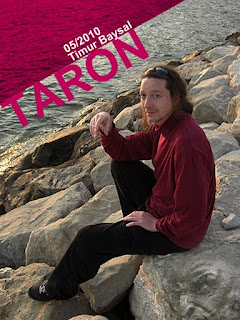 I was born and raised in Germany. It's ethics revolve around systematic dogma, not questioning the state and its authority, trickling down through the educational system into the idea that every profession requires proper documentation and certification.
I was born and raised in Germany. It's ethics revolve around systematic dogma, not questioning the state and its authority, trickling down through the educational system into the idea that every profession requires proper documentation and certification.Teaching yourself is being honored by a patronizing chuckle and positions of authority ordinarily
require proper boasting backed by many years of academical toiling.
But the beer has always been great. Aside from joking around, it has some great bonding qualities that make social interaction easy and plentiful as well as adding a great sense of humor about not having any.
Even while this may read like a joke, the concept of knowing what NOT to do had also great impact on my ethics.
By my own example, I've managed to go through the system in most unorthodox ways by skipping the years spent by others in universities and even dropping out of 12th grade, I think (school system is a bit different in Germany than in the US). I did so, because I had managed to make myself a freelancer and already earned more money than most, who'd come out of college. That also meant that I had to learn to market myself comfortably, or at least that became my choice.
I developed the rational of mutual benefit,
making sure that my work was serving the needs of the clients beyond expectations, while requesting a price they could easily justify and adequately satisfy myself.
A win-win strategy. The German spirit gives artists only few choices to deal with the way it meets them.
Either you become piercingly over confident and try to demand respect, or you humbly allow your work to speak for itself.
I chose the second route, which made me feel like a perfect alien in the US, but served my nerves quite well.
2. When you grew up, did you, as most artists, draw, paint, and act?
Yes. (of course he did .ed)
3. At what point did computers interest you as far as a tool for art, and why?
I was 14 when my father suddenly jumped up the chair after we saw a commercial for the commodore C16 on TV and asked me, if I wanted to go right at this moment to buy one. That was the first time in my life when my head exploded with joy. My sole interest has always been to create on these machines.
Not a big deal at the time, since nothing much was available in regards to software. Together with my friends, we wrote adventure games right away, making ASCI graphics and silly sound effects. But only a short time after that I understood how to deal with pixels.
The C128 came shortly after and with it there was no stopping me anymore. I wrote music, demos, intros, little games and we started a little scene group. When I was 15, I already knew exactly how to deal with pixels and manually antialias my illustrations.
That got me into my first professional job right then. But that's a different story.
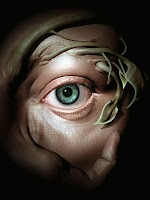 Initially I only had a hunch that possibilities would be nearly endless on computers to not just create still art, but to animate, even interact with it, and all the creative fields would find their application in them. I wasn't even interested in films as such, but rather the abstract wonder of art including time, sound and access. I was equally fascinated by programming, the brilliant puzzle that awarded you with adventures beyond your own imagination.
Initially I only had a hunch that possibilities would be nearly endless on computers to not just create still art, but to animate, even interact with it, and all the creative fields would find their application in them. I wasn't even interested in films as such, but rather the abstract wonder of art including time, sound and access. I was equally fascinated by programming, the brilliant puzzle that awarded you with adventures beyond your own imagination.I think all that made me recognize the power of the machine on a different level, acknowledging the benefit of working with the nature of the source, the suggestions of the machine itself. It later became part of my 3d modeling method's foundation to accept and follow the nature of the geometry and working with its directions.
4. Did you have any mentors, or artists, that affected the direction you took?
My mentors often found their connection to me through the above mentioned mutual benefit. Only a few key encounters gave me some wonderful revelations to carry with me to this day.
I'm so sorry, I forgot so many of the names, yet, I remember the faces and the spirit. I was almost always tied to wonderful, even if sometimes kind of sad spirits.
I tried to mention above that Germany isn't easy on artists and those with a gentle soul and not enough guts just fall by the wayside and can never really discover their full potential completely. Expectations are just so limiting and security is something that is tied to a denial of artistic freedom.
In the end I consider all my friends my mentors, even if it often might have been the other way around, but as for most fortunate people with exciting, or simply good friends, they have a strong influence on the direction one takes.
I must have been 12 or 13 when a friend of my older sister turned me on to fantasy art. I saw pictures from Boris and Frazetta (I'm happy for him, that he's made it to the next round, while I'm sad the world had to lose such a passionate and brilliant artist.
He left us with an immortal style that won't ever stop to influence the generations to come.). Seeing those pictures excited me a lot, of course, since I was already drawing wildly, but not with this kind of realism.
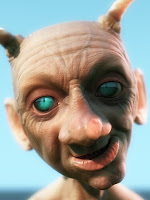 Most traditional art just doesn't have this kind of take on reality, so to say. Sure, there was Dali, who in his weirdness and odd simplification of realistic circumstances made it appear nearly easy to explore surrealism and take the detour into his own fantastic world. But at some point I had to shake them all off, because it all wasn't what I wanted to feel.
Most traditional art just doesn't have this kind of take on reality, so to say. Sure, there was Dali, who in his weirdness and odd simplification of realistic circumstances made it appear nearly easy to explore surrealism and take the detour into his own fantastic world. But at some point I had to shake them all off, because it all wasn't what I wanted to feel.5. A lot of the works you are known for, has that "Taron" look to it, disturbingly beautiful, strict in it's tone range, and both directly communicative, as well as subjectively ensnaring.
Is this a conscious decision, or a result of progress in the development of the creative process?
I respect the subject I create tremendously. I do not respect the technicality of the process at all, but the process itself, yet, never take my focus away from writing the nature and history of my creations.
I was going to write "creature" or "character", but to me any subject has the same need, be it a house, a hill or a jelly fish. Sometimes they are just passing by, doodles, funny little encounters. But most of the time when I really want to explore something, they become something or somebody, I know then. I don't make them as showcase puppets, I don't make them as means for anything but themselves or my own education, actually, whilst only initially.
Sometimes they grant me permission to exhibit certain advances, like Zbrush demonstrations or to show Messiah:Studio features, well...that might make them showcase puppets every now and then, but it's a side effect.
Test animation using Animation 01 Animation 02
I have always been seeking reality in a rather wholesome way, one that includes time. Even if it's not an animated picture, should be a testament to an unseen time, that explains what you're looking at. No method other than respect and a joy to connect to anybody and everything.
6. In your career you've been involved in some very interesting projects. Which of those gave you the greatest benefit as an artist, and what was it?
I severely dislike that question for some reason, because it casts a dark shadow over the majority of projects I was involved in, hahahahaha. Maybe three "ha"s would've been enough for this one, but frankly, the most unlikely jobs gave me the biggest kicks and the biggest kicks were for the most ungrateful projects.
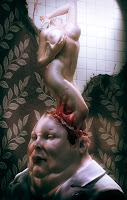 I think my personal research and urge to figure out aspects of natural forms have always given me the most benefit as an artist. But the second best benefit came from a friend of mine, Goro, who introduced me to a simply method of making paintings in Photoshop.
I think my personal research and urge to figure out aspects of natural forms have always given me the most benefit as an artist. But the second best benefit came from a friend of mine, Goro, who introduced me to a simply method of making paintings in Photoshop.It made it so simple to create entire environments and I was immediately taken by it. Prior to him I was mostly just doing isolated experiments, but that's when I finally got to explore truly wholesome sketches.
An experiment would be a mountain landscape, an alien city, a scene from a dream. I joined a 'daily sketches' forum back then for which I would actually do full paintings, everyday, within a few minutes, or some hours sometimes, but it really took me to the next level.
I later got to apply it on many projects, just the spirit of being aware how to design a complete canvas was so very liberating. I may have wished I could start mentioning some of the great films I got to work on, but I spare you the giggles for those, which were the most fun to me.
Ironically one of the biggest "AHA" moments came from a large scene for a teaser I did get to make, which triggered one of the most devastating moments for me personally and awarded me with one of the most grandiose moments of my career.
I overestimated myself and then somehow did not. I thought it was an awful precedence to go by, because it nearly gave me a heart attack, when I thought I could not pull it off, but... now you want to know what it was, right? Since you wouldn't even find it, if you were looking for it, I'm just gonna leave it as a mystery.
Some projects he have worked on (addition by editor)
Film: Gothika, Syriana, Battlefield Earth, Dogma
Timur is also part of the core group of advisory artists at MI - Link
End -interview part one - Continue to part Two

